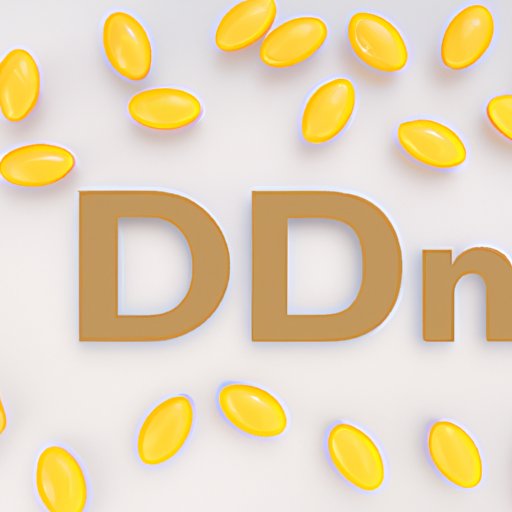
I. Introduction
When it comes to taking care of our health, it’s important to have a clear understanding of the nutrients our bodies require. One of these key nutrients is Vitamin D, which is essential for maintaining strong bones, supporting the immune system, and regulating cell growth. However, there are actually several different types of Vitamin D, including Vitamin D2 and Vitamin D3. In this article, we’ll take a closer look at Vitamin D3 and explore whether it’s the same as Vitamin D, or if there are important differences to be aware of.
II. What is Vitamin D?
Vitamin D is a fat-soluble vitamin that is naturally present in very few foods, but is found in fatty fish such as salmon and mackerel. It is also synthesized by the body when our skin is exposed to sunlight. Vitamin D plays an important role in regulating calcium levels in the body, which is essential for healthy bones. It also supports the immune system and helps to prevent chronic disease. There are two main forms of Vitamin D: Vitamin D2 (ergocalciferol) and Vitamin D3 (cholecalciferol).
III. What is Vitamin D3?
Vitamin D3 is a type of Vitamin D that is naturally produced by the skin when exposed to sunlight. In addition, it can be found in some fortified foods or taken as a supplement. Vitamin D3 is the preferred form of Vitamin D for the human body, as it is more easily absorbed and utilized compared to other forms.
The body processes Vitamin D3 differently than Vitamin D2. Specifically, Vitamin D3 is metabolized in the liver to produce 25-hydroxyvitamin D3 (25(OH)D3). This form of Vitamin D is then further processed in the kidneys to produce the biologically active form of Vitamin D, known as 1,25-dihydroxyvitamin D3 (1,25(OH)2D3). The biologically active form of Vitamin D is what is responsible for the many health benefits associated with this nutrient.
IV. Differences between Vitamin D and Vitamin D3
There are some molecular differences between Vitamin D2 and Vitamin D3 that are worth noting. Specifically, Vitamin D2 has a slightly different chemical structure than Vitamin D3, meaning that the two vitamins are metabolized differently in the body. This can result in differences in their bioavailability and effectiveness. Additionally, some studies have suggested that Vitamin D3 may be more effective at maintaining adequate levels of Vitamin D in the body compared to Vitamin D2.
V. Vitamin D3 vs Vitamin D: Which is better for you?
When it comes to determining which form of Vitamin D is better, it depends on a few different factors. For starters, it’s worth noting that Vitamin D deficiency is relatively common in many populations, especially those living in northern latitudes or who have limited sun exposure. Some people may also be at greater risk for a deficiency due to medical conditions or other factors.
In general, Vitamin D3 is considered to be the superior form of Vitamin D due to its greater bioavailability and effectiveness at raising levels of circulating Vitamin D in the body. However, Vitamin D2 can still be an effective means of increasing Vitamin D levels for those who may not have access to Vitamin D3 or who have specific medical needs.
For individuals who may be at greater risk for deficiency, such as those with darker skin or who live in areas with limited sunlight, Vitamin D supplements may be recommended. When choosing a supplement, it’s important to consider whether it contains Vitamin D2 or Vitamin D3. For those who are concerned about getting adequate Vitamin D from their diet, it’s worth noting that fortified milk and other dairy products often contain Vitamin D3, which can be a good source of this nutrient.
VI. The importance of understanding the distinction between Vitamin D and Vitamin D3
Understanding the differences between Vitamin D and Vitamin D3 can help individuals make informed decisions about their health. Specifically, knowing which type of Vitamin D is most effective at raising levels of this nutrient in the body can help people choose the best supplements or dietary sources to meet their needs. Additionally, research has shown that getting adequate levels of Vitamin D may be important for preventing chronic diseases, including heart disease, certain types of cancer, and autoimmune disorders.
VII. Everything you need to know about Vitamin D and Vitamin D3
To summarize, Vitamin D is a key nutrient that plays an important role in maintaining bone health, supporting the immune system, and regulating cell growth. Vitamin D3 is a type of Vitamin D that is more easily absorbed and utilized by the body compared to other forms. While both Vitamin D2 and Vitamin D3 can be effective at increasing levels of circulating Vitamin D in the body, Vitamin D3 is generally considered to be the superior form.
To ensure you are getting adequate levels of Vitamin D, it’s recommended to eat a varied diet that includes sources of Vitamin D, such as fatty fish or fortified dairy products, and to get limited exposure to sunlight . For those who may be at risk for deficiency, supplements may be recommended. Always speak with a healthcare provider before starting any new supplement regimen, particularly if you have specific medical needs or concerns.
VIII. Conclusion
Understanding the distinction between Vitamin D and Vitamin D3 is important for maintaining good health and preventing chronic disease. By choosing sources of this nutrient that are most effective at raising levels of circulating Vitamin D in the body, individuals can take steps to safeguard their health and wellness. Be sure to speak with a healthcare provider before starting any new supplement regimens or making significant changes to your diet or lifestyle.




